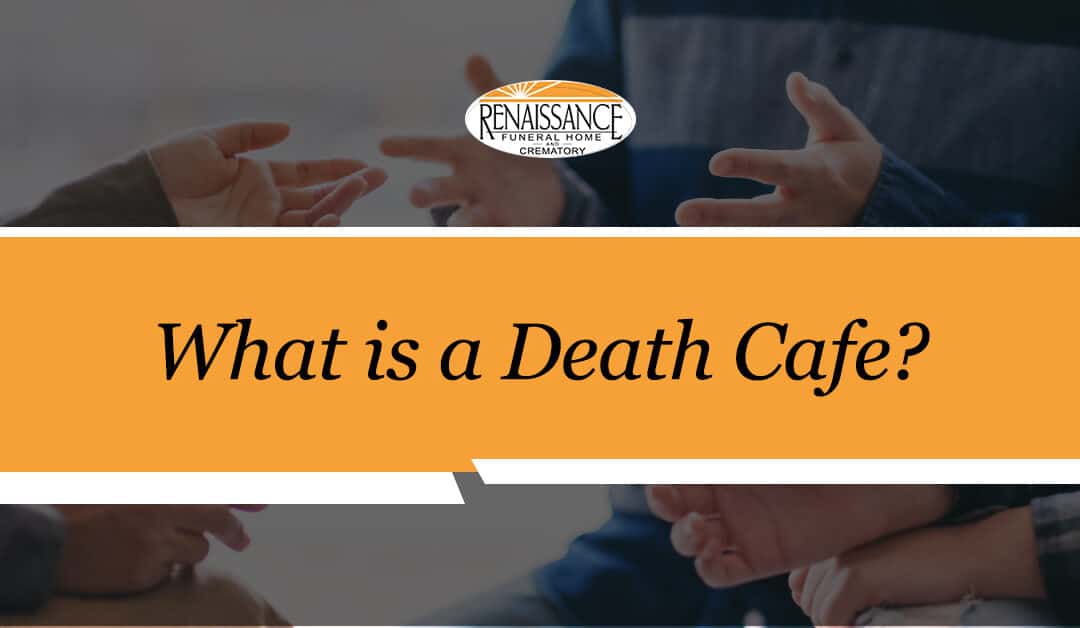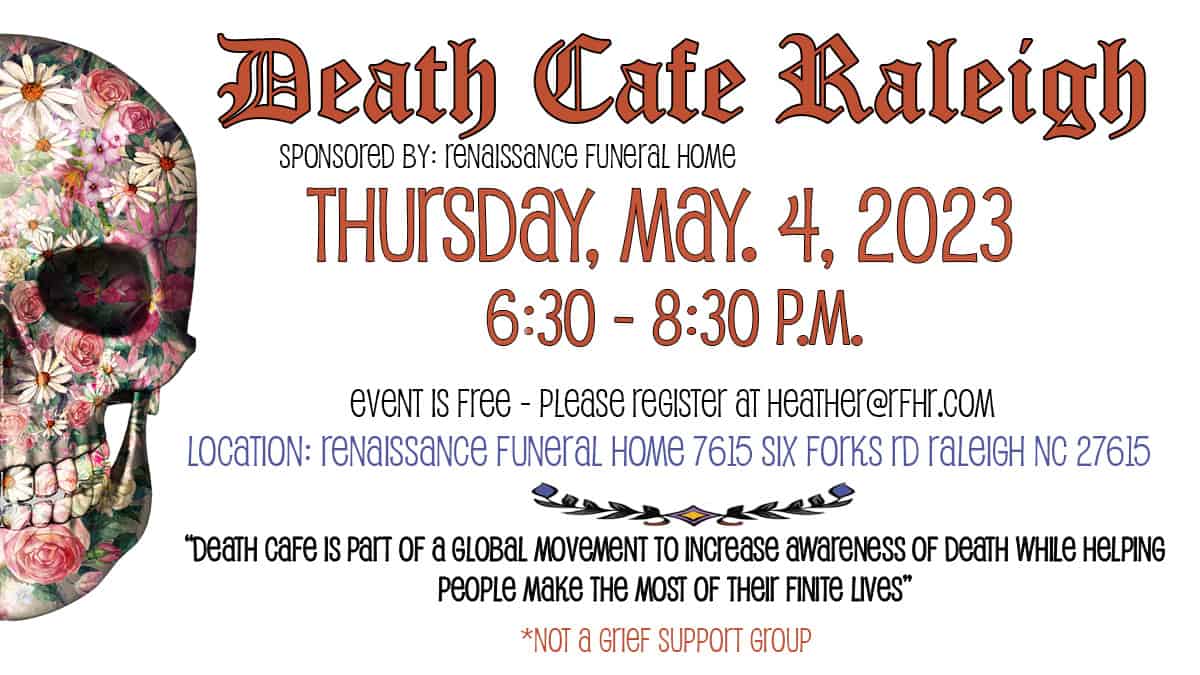When it comes to end-of-life discussions, many people feel uncomfortable or unsure of how to approach the subject. However, Death Cafes offer a welcoming and safe space for individuals to come together and openly talk about death, dying, and the various emotions and experiences that come with it. In this blog post, we will explore what a Death Cafe is, the purpose behind it, and the benefits of attending one.
Whether you are personally dealing with grief or simply looking to learn more about end-of-life conversations, this post will provide you with valuable insights into this unique and important concept.
In the triangle area, Heather Hill offers “Death Cafe Raleigh” at Renaissance Funeral Home and Crematory. Follow the Death Cafe Raleigh Facebook Page for more information and to stay on top of meetings and events! You can also listen to the informative “Aging Matters” podcast about Death Cafes featuring Heather Hill.
What is a Death Cafe?
A Death Cafe is a gathering of people who come together to discuss death and dying in a supportive and non-judgmental environment. These events are usually held in cafes, community centers, and funeral homes and are facilitated by trained volunteers.
An example of an invite to a funeral home sponsored death cafe event:
The primary purpose of a Death Cafe is to provide a space where people can talk openly about death, share their experiences, and ask questions without feeling uncomfortable or judged.
The discussions at a Death Cafe are participant-led and cover a wide range of topics related to death, dying, and grief. The talk ground rules include the need for a supportive environment where anyone and everyone who comes can engage in the conversation.
Some topics a death cafe session may touch on include:
- Talking about death and personal experiences
- Discussion about increasing awareness of the importance of life-affirming habits and how to live life intentionally
- Talk about death beliefs
- How to plan for a “good death”
- Discussions about assisted suicide
- What it feels like to lose family members
- How experiencing the death of a family member can be one of the most significant events of a life
- Coming seeking answers about why there is a “talk about death taboo” in our society
- Contemporary society and our idea that death is a taboo subject
- Fears or struggles with death talk
- Cultural practices surrounding death at the present moment
- Practical considerations concerning end of life planning
The goal is not to offer solutions or advice but to foster an open dialogue and promote greater understanding and acceptance of death as a natural part of life.
History of Death Cafe
Jon Underwood and Sue Barsky Reid developed The Death Cafe model based on the ideas of Bernard Crettaz. Death Cafe has no staff. Jon Underwood voluntarily led the cafe in Hackney, East London, until his sudden death in June 2017.
Susan Barsky Reid (Jon’s mother) and his sister Jools Barsky began to lead the group after Jon’s death. Megan Mooney runs the Death Cafe non-profit organization’s Facebook Page. Lizzy Miles ran the first Death Cafe in the U.S. (1)
What Should I Expect When Attending A Death Café?
If you plan to attend your first death cafe, you may wonder what will happen there.
Upon arrival, you will be greeted by a trained facilitator who will guide the discussion and ensure that everyone has the opportunity to share their thoughts and experiences. The beginning of a group session may include ice breakers as conversation starters.
Generally, you will drink tea and eat cake or other refreshments as you engage in discussions that increase awareness of death. Whether you engage as an active participant or just come to enjoy being a part of a small group, you are welcome.
Specific communities of death cafe will have a different feel. With individuals attending for many different reasons, each group may have discussions that differ entirely from another group! Your discussion will also depend on the death cafe facilitator.
However, if you feel nervous about a meeting, you can always bring friends with you. Often strangers become close friends while gathering to discuss these ideas never discussed in our society!
It’s important to note that these groups are not intended to provide therapy or counseling but rather a safe space for individuals to explore their thoughts and feelings about death and dying. However, by attending a Death Cafe, you can expect to gain a greater understanding and acceptance of death as a natural part of life and connect with others who share similar experiences and concerns.
Our Human Experience With Death
Individuals in the United States now experience death and dying less as a reality in their lives compared to those living in the early 1900s and before.
Longer Life Expectancy from Birth (LEB)
Significant advances in medical technology and healthcare systems allow individuals to live longer and healthier lives around now, reducing the incidence of death from common diseases and illnesses. As a result, people today are less likely to experience the death of loved ones, particularly at a young age, compared to previous generations.
According to a study published in the Journal of the American Medical Association, life expectancy in the United States has increased by almost 30 years since the early 1900s, with the average life expectancy for a person born in the US in 2020 being 77 years.
The increase in life expectancy has led to a significant reduction in mortality rates, particularly for infants and young children. In 1900, the infant mortality rate in the US was around 100 deaths per 1,000 live births, compared to just 5.6 deaths per 1,000 live births in 2019. (1)
According to Wikipedia, “The combination of high infant mortality and deaths in young adulthood from accidents, epidemics, plagues, wars, and childbirth, before modern medicine was widely available, significantly lowers Life Expectancy at Birth (LEB).”
In addition, Life Expectancy at Birth (LEB) during the different ages of the world shows we experience less death and dying in the world now in general.
- In the Bronze Age and the Iron Age, human life expectancy at birth (LEB) was 26 years.
- In 2010, world LEB was 67.2 years. (2)
No Longer Dying At Home
Another factor contributing to the reduced experience of death and dying in the US is the growing trend of individuals dying in hospitals rather than at home. (3)
According to the Centers for Disease Control and Prevention, over 68% of deaths in the US now occur in hospital settings, compared to just 20% in 1949. While hospital deaths have been associated with higher quality end-of-life care, they have also led to a decreased exposure to death and dying for individuals and families.
Cultural Focus
In addition, cultural changes over the past several decades have also contributed to a reduced experience of death and dying in the US. As a society, we have become increasingly focused on youth, beauty, and vitality, leading to a societal taboo around discussing and accepting the inevitability of death. As a result, people today are less likely to engage in conversations around death and dying, and may struggle to cope with end-of-life decisions and experiences.
Recognizing the inevitability of death and engaging in open conversations around end-of-life planning and care can help individuals and families to better cope with end-of-life experiences when they do arise.
What Kinds of People Attend Death Cafes?
Attending a local Death Cafe meeting in North Carolina can bring together a diverse range of individuals from all walks of life. The death cafe people group may include those of all races, religions, beliefs, and experiences with death. Some attendees may have experienced a recent loss of a loved one, while others may be interested in exploring their own feelings and beliefs about death and dying.
The group may include individuals who are interested in exploring end-of-life care options, such as hospice care, palliative care, or funeral planning. There may also be individuals who work in related fields, such as healthcare professionals, funeral directors, or grief counselors. These individuals may be seeking to learn more about how they can better support their patients or clients through the dying process.
Religious and spiritual beliefs may also play a role in why individuals choose to attend a Death Cafe. Some attendees may be seeking a space where they can openly discuss their beliefs and practices around death and dying, while others may be seeking to explore new perspectives or find comfort in a community of like-minded individuals.
Overall, the attendees at a local Death Cafe meeting may be a diverse group of individuals united by a common interest in exploring and discussing death and dying in a safe and welcoming environment. Regardless of their backgrounds or experiences, all attendees are encouraged to share their thoughts and feelings openly and respectfully, fostering an atmosphere of openness and acceptance.
We Are Here For You
At Renaissance Funeral Home and Crematory, our dedicated staff creates beautiful and memorable events for your loved ones who pass on. However, we also want to help you grow and learn more about what it means to die and how to cope with end-of-life planning and talk. Talking with others about death is a vital part of grieving when you experience a loss. Discussing how you feel about a terminal illness or death in the family can make all the difference in your ability to work through your pain and continue to live with hope.
If you want to know about our upcoming death cafes, need a referral for grief counseling, would like to set up funeral or cremation services, or make a preplan, we are here for you and ready to assist you. Get in touch today and start finding your way forward.




